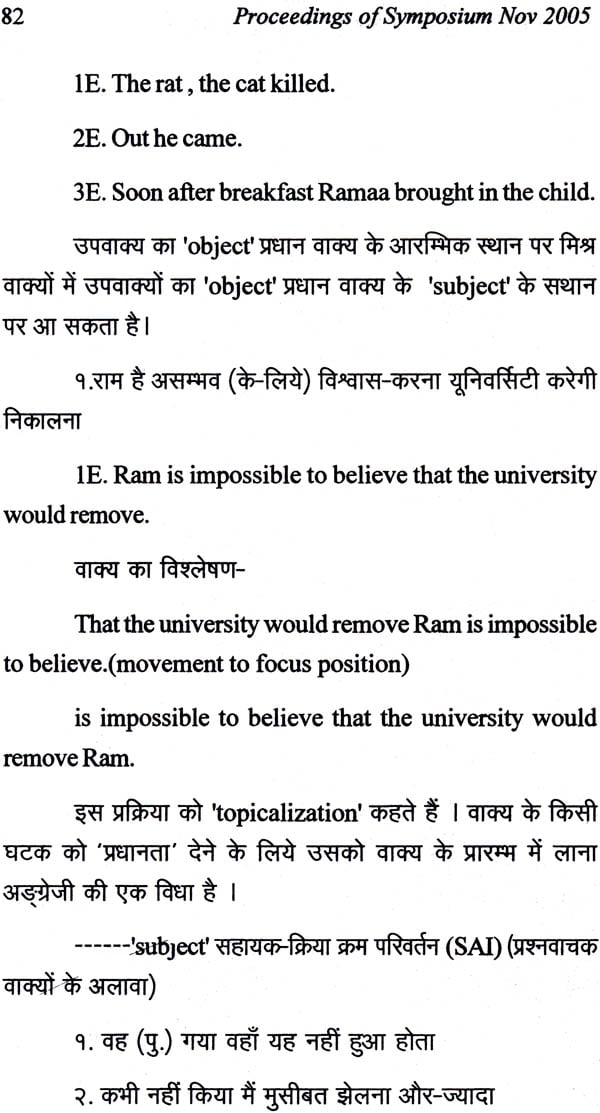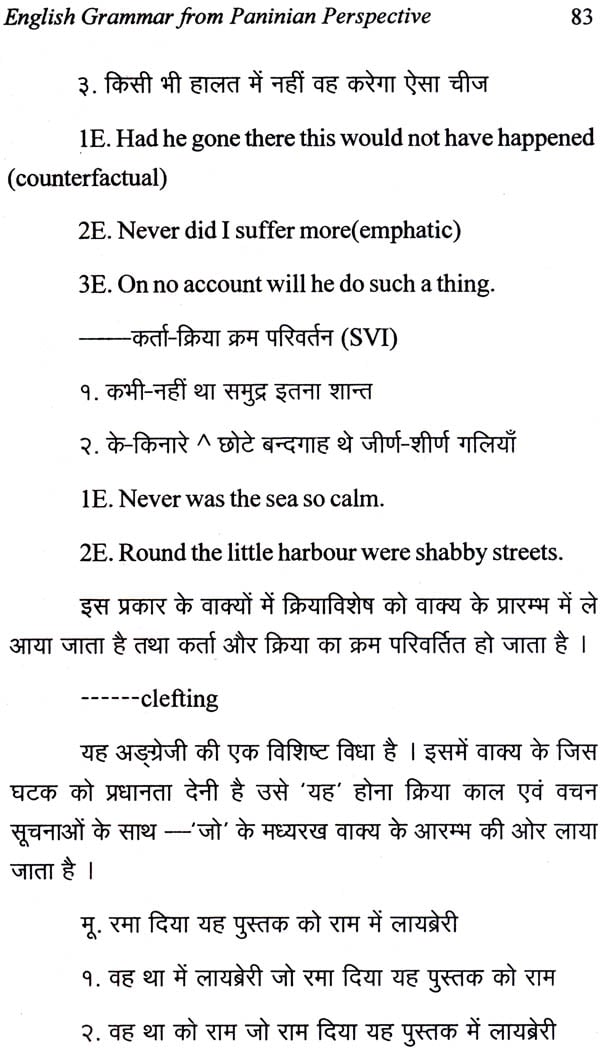
English Grammar From Paninian Perspective
Book Specification
| Item Code: | NAC822 |
| Publisher: | Rashtriya Sanskrit Vidyapeetha, Tirupati |
| Edition: | 2007 |
| Pages: | 233 |
| Cover: | Hardcover |
| Other Details | 9.5 Inch X 6.5 Inch |
| Weight | 570 gm |
Book Description
Chief Editor: Prof. H.K. Satapathy
Editors: Prof. S. Satyanarayana Murthy, Dr. R.J. Rama Sree And Dr. Srinivasa Varakhedi
It is a matter of great pleasure that proceedings of National Symposium on English Grammar in the light of Paninian Perspective organized by the Vidyapeetha in November 2005 are being brought out by the Organizers in the interest of the scholars. The Rashtriya Sanskrit Vidyapeetha a Universityunder Sec. 3 of the UGC Act is the only Sanskrit University in the country in introducing two separate Sanskrit computer oriented post graduate courses one in Natural language processing for Post Acharya students of traditional Shastras and another in Shabdabodha system and computational linguistics for the graduated in different disciplines of modern and traditions streams. The main purpose of these courses is to have an in-depth analytical study of Sanskrit language keeping in view its suitability to the functioning of computers of the contemporary scientific world the significant reason for which the Sanskrit language has been considered computer friendly is its scientific and systematic grammar propounded by the great linguist of all time panini.
Panini is claimed as the greatest intellectual giant in the field of computational linguistics for systematizing the world’s oldest and richest language within the framework of his monumental work “Ashtadhyayi” The method he had followed the procedure he had laid down and the avenue he had devised in the said book of grammar while analyzing the finest and subtlest aspects of a language is unique and uncommon in nature for which the great grammarian is still remembered with reverence be scholars in Eastern and western systems of knowledge.
The study and research on Panini over the years has become an unending process because of its deep rooted implications in the context of linguistic origin, history, development and analysis. Even in the contemporary scientific society the study of Asthadhyayi and research on Panini has become inevitable for arriving at certain mutually agreed upon useful findings particularly in respect of knowledge representation and natural language processing. Keeping this important aspect in view the faculty members of concerned departments of the University had organized a national seminar in which several number of reputed scholars from both the science and Sanskrit streams attended and presented their valuable papers.
The papers were discussed and deliberated upon and suitable modifications have been made basing upon the outcome of the collective participation. The contents of all these papers, I am sure will be highly useful for the scholars engaged in the concerned field of research. The faculty of Sabdabodha system and computational linguistics and the Natural language processing and other connected wit the organization of the Seminar and printing of the proceedings of the Seminar deserve appreciation. I am confident that this publication would be a unique treasure in the world of scholars that can provide expected guidance and feedbacks for opening some new vistas of knowledge particularly in the area of computers and Sanskrit.
This book contains the proceedings of the national symposium on English Grammar in the light of Paaninian perspective organized by Rashtriya Sanskrit Vidyapeetha, Deemed University Tirupati held in November 2005.
In 2004 Rashtriya Sanskrit Vidyapeetha initiated two separate P.G Courses one in Natural Language processing for post Acharya students of traditional Shastras under centre for excellence and the other one in Shabdabodha systems & Computational linguistics for the graduates in different disciplines of modern and traditional streams sanctioned by UGC as an innovative course initiated by the Departments of computer science Vyakarana and Nyaya. The focus of these courses in not only to teach the concepts of traditional shastras related to language analysis but also to show their relevance in today’s context. In order to achieve this students of these courses are encouraged to use the concepts learnt from Shastras in some applications. One such area identified is application of the concepts of Painian system of Grammar.
It is well known that Panini has written grammar for Sanskrit language. However it is also believed by many scholars that the concepts used therein are universal and applicable across all languages. In order to show the universality of the Paanini’s grammar it is necessary to extract the universal concepts form the core source and show their applicability in other languages. It is not an easy task to extract the universal concepts without some exercises. The universal concepts can.
Be derived when we apply Paaninain way of analysis to other modern languages. This fact has been established by many research activities through application of the Paninian concepts on Indian languages and their results. This claim some times seems to be very obvious for the reason that Indian languages are under great influence of Sanskrit as they are all originated from Sanskrit. Therefore a new approach was thought. Aim of this approach is to explain some of the structural differences in English and Indian languages from Paaninan viewpoint.
The faculty and students worked on the structural differences in Indian languages and English through Paaninain framework under the guidance of Sri Vineeth Chaitanyaji a well known researcher in NLP under traditional aspects. The discussions have resulted in some of the new insights and explanations of some phenomenon in English language. These findings were to be tested and proposed for discussion with other eminent Paninian scholars and linguists.
As a first step we thought of inviting eminent scholars of different disciplines like Vyakarana, Nyaya, Linguistics, NLP and computer science to symposium conducted at Rashtriya Sanskrit Vidyapeetha. The proposal of conducting a national symposium with the financial support from the centre for excellence funds we approved by the then vice chancellor Prof. K.E. Govindam.
The invitation of the symposium was sent to the scholars selectively with an introductory note and issues involved in the problem followed by a theme paper. The scholars responded with their confirmed presence and their reactions on the issues raised were recorded.
More than twenty five eminent scholars of different disciplines attended the symposium and discussed the points raised in the theme papers by the faculty of Rashtriya Sanskrit Vidyapeetha NLP research team. These discussions lead to different dimension to the research undertaken. Some new thoughts were generated. Some novel ideas were suggested. The experts supported this interdisciplinary research activity and they also suggested that a complete grammar should be written for English on the basis of Paninian model.
This symposium gave the students a first hand experience of the theoretical issues involved in the application of traditional concepts. The symposium has also given rise to new dimensions to the interdisciplinary research.
We hope that the proceedings of the symposium will be of great use to scholars and students of NLP field.
The present book comprises four sections theme papers response papers, symposium addresses and a brief account of panel discussion on interdisciplinary research program. A part from theme paper presentation there were several presentations by various scholars. Those presentations and the discussions that followed them have been left out. However core discussions are covered and preserved in some papers published here. Therefore we apologize to the scholars for not including their contributions explicitly in this publication which is brought out in a shortest period.
| Theme papers | ||
| 1 | Statement of Problem | 13-15 |
| 2 | Bhartiyabhashabhigasya Aadgalbhashavagamsokaryartha Paniniadrishtya Aadgalbhashya Vishleshan | 16-33 |
| 3 | English Grammar from Hindi Speaker’s point of View in the light of Paaninian grammar | 34-59 |
| 4 | Adangragy Vakya Srachna Bhartiya Vyakarnik Drishtikon se | 60-88 |
| Response Papers | ||
| 5 | Some Remarks on a Paninian Approach to English grammar | 89-102 |
| 6 | Panini Vision of Encodement | 103-133 |
| 7 | Natural Language Processing in Paninian perspective An AI View | 134-173 |
| 8 | An English Sanskrit Machine Translation using link parser | 174-180 |
| Addresses by Chief Guests | ||
| 9 | Multidisciplinary of Sanskrit (Inaugrual Speech) | 181-188 |
| 10 | Paaniniansya Assemta | 189-192 |
| 11 | Promote Indian ness in education | 193-216 |
| Appendix | ||
| 12 | Innovative education and research in Sanskrit | 217-224 |
| 13 | Details about the different activities in Sanskrit net center | 225-233 |







